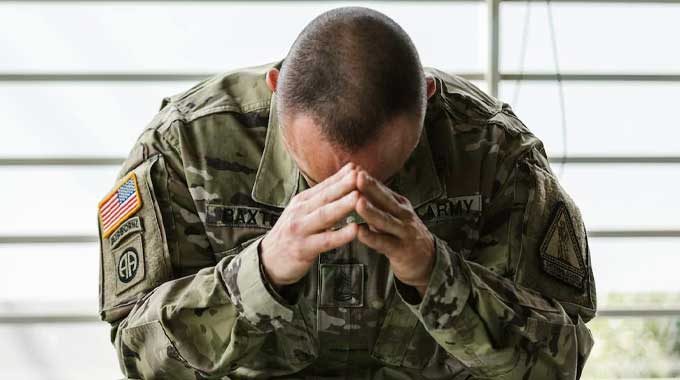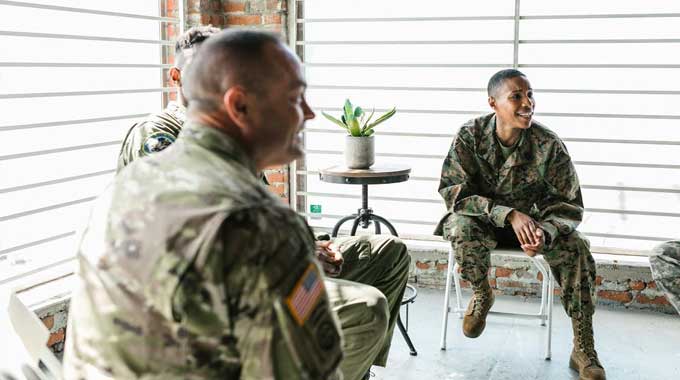
It can be difficult time a loved one is struggling with their mental health. Someone with PTSD may have a hard time with their relationships and may pull away from you, even if you are a family member or close friend.
But luckily, there are ways in which to help someone with PTSD.
Post-traumatic stress disorder (PTSD) is a serious mental health condition. It arises due to witnessing or experiencing a deeply traumatic event and is related to someone's way of processing memories of the event. It leads to complex cognitive, affective, somatic, and behavioral effects. The body of someone suffering from PTSD may respond as if the event is still happening presently, or is about to happen in the future.
The traumatic events may include being involved in or witnessing catastrophes, such as earthquakes or other natural events, war or terrorism. Trauma can also come from experiencing physical injuries such as disability or amputations, physical or sexual abuse, relationship breakdowns, a car accident, or terminal illness. Although any of these events may lead to PTSD, the leading cause of PTSD is sexual relationship violence at 33%, which includes rape, childhood sexual abuse, and intimate partner violence.
Symptoms of PTSD may occur immediately after the traumatic event, but could also take weeks, months, or years to present. It can lead to short-term memory loss, and may also have long-term psychological effects that could be chronic.
This condition can be extremely difficult to manage and impacts both the person who has experienced trauma and the closest ones around them.
Complex post-traumatic stress disorder, also known as CPTSD, is usually related to a series of repeatedly occurring events that happened over a period of time, whereas PTSD is usually related to a single event or series over a short period. Symptoms of complex PTSD may include additional effects to that of PTSD, such as a negative self-concept or interpersonal disturbances, or feeling very distrustful and angry towards the world.
Within the first month after a traumatic event, a person may have severe stress symptoms and suffer from acute stress disorder (ASD). This includes feeling afraid, feeling on edge, and having difficulty sleeping. It could also include flashbacks or nightmares.
When these symptoms last longer than a month or start to influence daily life, Posttraumatic stress disorder may have developed. According to the National Center for PTSD, about12 million adults in the U.S. have PTSD during a given year.

Symptoms that make it hard for a loved one to go about their daily routine, go to work, and handle important tasks or responsibilities can indicate PTSD. Without expert treatment, PTSD can lead to anxiety, depression, substance abuse and addiction, social withdrawal and isolation, chronic pain, suicidal thoughts and self-harm, and relationship and work problems.
The most common symptoms are flashbacks - when someone relives aspects of the traumatic event - that may come as vivid or intrusive memories. Another sign is sleep disturbances and hyperarousal. The presence of avoidance symptoms is also sometimes a way to recognize PTSD.
Other common signs include:

It may feel overwhelming to figure out how to help someone with PTSD, but taking steps and an active role in a loved one's recovery can empower them. Managing PTSD takes time, patience, dedication, and effort, but it is possible. Support in all ways can help, and professional treatment may be the most helpful.
Accurate information is vital for living with a mental health problem or supporting another who is. An understanding of post-traumatic stress disorder, its causes, signs, and treatment options available can equip someone for helping a loved one more successfully.
Additional reading, self-study, and becoming aware of triggers and biases are useful. As a loved one processes the traumatic experience, there may be many conversations about it; learning about ASD and PTSD can enable someone to be of much more help.
Triggers may be anything that causes a response of fear. While it could be something that seems very ordinary to most people, it may remind someone with PTSD of past trauma.
It may be virtually anything, such as a smell, sound, thought, feeling, object, people, or location, or can be nuanced to the effect of the weather. As triggers are specific and very unique to a person's experience, asking and talking about them can be helpful.
One example is a friend becoming distressed when they hear loud noises in large crowds, which may make them experience flashbacks or panic attacks. Another example is if someone experienced trauma on a cloudy, overcast day, this type of weather may trigger them. A veteran may be triggered by seeing the people they were in combat with, for example.
By understanding another person's triggers, someone can help them to manage situations or things that cause them anxiety. It also enables a person to respect their boundaries and be prepared if they get triggered. Better awareness of what makes a person feel worse can help to prevent exposure to those triggers.
One of the best ways to support someone with PTSD is by being a good listener. This is vital for social support, and active listening can be very helpful.
While it may be difficult, it is best not to judge and push a person into talking. It may be hard to understand why a family member or friend can not move on from an event, and it is natural to wish that things can return to normal. But applying pressure or blame, or comparing your feelings or experiences, is not helpful.
When they are ready to talk, it is important to let them know that you are engaged, there to listen, and to acknowledge their spoken feelings. Allowing a person with PTSD to talk at their own pace, and not dismissing or assuming how they felt or are presently feeling is helpful.
Someone living with PTSD may experience triggers of their past trauma even if there is no external danger or threat. They can feel unsafe and like they have lost control, and any statements that may create unfair comparisons, cause them to feel shame, or minimize their feelings are most likely to increase their PTSD symptoms. It is best to avoid statements about overreaction when they are experiencing flashbacks, for example, or telling them that others have it worse when they cry a lot.
Instead, staying calm and gently identifying the fact that they are experiencing a flashback can offset fear. Verbal reassurances from loved ones can create a sense of calm. Letting a loved one know that they will get through it and that another is there for them can help them feel safe. Avoid sudden movements, and encourage slow and deep breathing.
PTSD can cause a person to feel on edge. They may be jumpy or easily startled, so hugging or touching them without permission may be a trigger. It may be best to give space, not to surprise or startle, and to avoid crowding a person suffering from PTSD.
Changes in a loved one can have a significant impact on other family members and friends.
Support systems must stay positive. That means that your health matters a lot too, and keeping it sound can support your loved one. Setting personal boundaries and protecting your well-being can be helpful.
When supporting someone struggling with PTSD, having a look at oneself and taking steps to evaluate emotions and mood is important.
Traumatic events may also have a major impact on close friends and family through secondary trauma. This is when close ones experience PTSD symptoms themselves while supporting someone going through trauma. Seeking therapy, or joining family support groups can help ensure that you are handling pressure healthily, and that coping mechanisms remain healthy.
Social withdrawal is common for people with PTSD. They may feel or believe that others do not understand what they are going through, or fear burdening others. Shame or guilt may overcome them.
But higher levels of social support can result in less intense symptoms of PTSD. It may help to encourage a loved one to spend time with family and friends or join them on a walk so that they may leave the house for a little while each day.
All of these tips may be helpful, but in mental illness, there are cases where a professional therapist can not be replaced. Encouraging a loved one to seek treatment is the best thing a person can do to support their healing process.
Trauma is a delicate process, and a trained professional can truly offer the best outcomes.
As a friend or a family member, trying to force a loved one to get help or attempting to cure them will not work. But taking positive steps in support can motivate them to get the help they need. Encourage a loved one to talk to a doctor or a mental health professional, and if they are ready to engage, support their decision.
Others who have gone through traumatic experiences may provide a loved one with a sense of feeling understood. Support groups are a great tool for helping people with PTSD feel less alone, less damaged, and supported. Encourage your loved one to join one of these.

Healthcare professionals will evaluate a person's mental and physical health. In this way, they have a detailed understanding of each individual's needs and can design a treatment plan accordingly.
There are many available treatments for PTSD. Some trauma victims respond best to cognitive behavioral therapy. Others respond to exposure therapy, where a person is gradually exposed to fear in a safe environment. Medications are also used in some cases but it depends on the individual.
Transcranial magnetic stimulation (TMS), a non-invasive brain stimulation therapy, is another form of treatment for PTSD, which uses electromagnetic waves and magnetic stimulation to target areas of the brain.
If you think that a loved one is suffering from PTSD, contact GIA Miami today.
Our compassionate and experienced team understands that the recovery process is unique for everyone. That is why we start with a combination of scientifically and clinically validated tests and design a treatment program specifically for you. GIA Miami then offers comprehensive PTSD treatment through a range of evidence-based therapies.
We know that there are many responsibilities outside of recovery, which is why our outpatient model ensures flexibility and fluidity. TMS therapy at GIA Miami also allows you to continue your daily routine right after receiving treatment.
GIA Miami's crossover of cutting-edge neuroscience and traditional psychological practices provides the pinnacle of treatment for mental health conditions. If you or a loved one has experienced PTSD then get in contact today to find out how we can help you.